The Problem with Stone
Where stone corrodes and chips easily, our resin planters remain impervious to weather.
Lots of products are made of granite, clay or concrete. Granite is beautiful and makes stunning counter-tops. Clay is natural and potters can throw it into all kinds of useful or decorative items. Concrete is extremely versatile and is used in building, paving and other industrial or urban applications.
Heavy
Stone weighs around ten times as much as our Linear Low Density Polyethylene resin. A large concrete planter pot could weigh around 600 pounds or more, that’s a huge shipping cost! A heavy item made of stone would also require a lot more packaging before it is shipped along with any additional transportation fees.
Porous
Concrete and stone are porous, meaning water can seep through the surface and stain, damaging the product. It can also suffer water leaching in which concrete leaks moisture, causing bacteria, mold and fungus to grow. Granite can be sealed against moisture, but would need regular maintenance. Stone products can also only be sealed inside OR outside to prevent trapping moisture. This shows that the porous nature of stone isn’t ideal for growing plants in.
Planters are meant to hold soil and plants. Unfortunately, concrete cannot contract and expand in the winter when soil freezes and thaws. This can cause your stone planter to crack or break. Even during the summer, tree roots will grow up from the soil into concrete sidewalks and split or break the concrete slabs because cement cannot bend. Concrete can also be damaged by corrosion, since it contains aluminum and is often reinforced with steel or other metals.



Traditional Methods
Concrete is generally comprised of three ingredients: Water, Aggregate, and Cement.
Aggregate is a mix of crushed rock, gravel, or ground-up broken concrete.
The most common cement is Portland cement, which is a mixture of aluminum oxides, calcium oxides, and silicon oxides. Calcium, usually as limestone, is heated with clay to 1500 degrees C in a cement kiln and then ground up with a sulfate.
Cement kilns are massive, complicated industrial ovens that use a lot of energy and generate emissions.
Hazard / Unhealthy
The concrete industry is one of the three top producers of carbon dioxide. Concrete workers are exposed to concrete dust, which contains crystallized silica dust. When inhaled, this dust can cause silicosis: inflammation and scarring of the lungs. Silicosis is often misdiagnosed as pneumonia or tuberculosis. Symptoms include fever, coughing, shortness of breath, and cyanosis (blue skin caused by insufficient oxygen).
TerraCast® Methods
TerraCast® is committed to the environment and uses up to 100% post-consumer recycled materials. We use natural gas to heat our ovens and reclaimed water in our cooling chambers. Our products help to contribute the US Green Building Council, our resin products qualify for LEED credits. Our resin is roto-molded into beautiful planters and other functional, decorative items.
Our lightweight resin is less costly when shipping and one or two people can easily arrange and install even our largest products. Our durable products require no maintenance. Since the resin is non-porous and non-hydroscopic no water gets inside, preventing leaking, leaching, staining or discoloring. Our products are even graffiti-resistant!
About Us
All of our products are made in America. All offices, warehouses, facilities and factories stand proud on US soil. Originally founded in 1969, we have remained an American owned and operated company.
Our Products
A Terracast® product is designed to beat out the competition in every conceivable way. Our products are customizable, lightweight, weather/graffiti resistant, eco-friendly, and almost indestructible.
Contact Us
When you contact Terracast® you will always be met with a friendly voice. We want to make sure you are well taken care of whether you're a new customer or have been doing business with us for 20 years.
